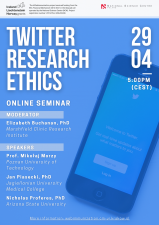Seminarium online poświęcone etyce badań naukowych na Twitterze

| Data: Czwartek, 29 kwietnia 2021, 17.00 – 20.00 (CEST) | |
| Miejsce: Teams (online) | |
| Informacje o prelegentach oraz ich prezentacjach |
Wydarzenie odbyło się w czwartek, 29 kwietnia 2021r. i zostało przeprowadzone w języku angielskim.
Nagranie seminarium jest dostępne na poniższej stronie oraz na naszym kanale YouTube. Zapraszamy również do śledzenia naszego profilu na platformie Twitter oraz Facebook (@webimmunization), aby być na bieżąco informowanym o wydarzeniach odbywających się w ramach projektu naukowego #Cyber_odporność!
Tutaj możesz obejrzeć całe nagranie:
Nagrania wideo z poszczególnych sesji dostępne są poniżej, zgodnie z programem seminarium:
PROGRAM I NAGRANIA:
17.00 – 17.10: Powitanie i wstęp – Jan Piasecki, PhD (UJ CM, kierownik projektu #Cyber_odporność) oraz Elizabeth Buchanan, PhD (Instytut Badawczy Kliniki Marshfield, „Setting the Stage: IRE Then and Now”)
17.10 – 17.40: „Machine Learning Pitfalls, Or What Could Go Wrong?”
Prof. Mikołaj Morzy
Politechnika Poznańska
17.40 – 18.00: „Ethical Framework for Webimmunization Score on Twitter.”
Jan Piasecki, PhD
Uniwersytet Jagielloński Collegium Medicum
18.00 – 18.20: „Ethics for Twitter Research Beyond Review Boards.”
Nicholas Proferes, PhD
Uniwersytet Stanu Arizona
18.20 – 19.00: Dyskusja
Więcej informacji na temat prelegentów oraz ich przemówień można znaleźć w sekcji Prelegenci & Abstrakty.
Researchers have blind spots, biases, and can be prone to wishful thinking. Therefore, equipped with good intentions, we would like to mitigate the moral risks associated with our research project. During the seminar, we are going to discuss the ethical challenges of the #webimmunization project with Internet research ethicists: Elizabeth A. Buchanan, PhD and Nicolas J. Proferes, PhD. We are also open to contributions of other participants. Moreover, we hope that this seminar will contribute to general discussion regarding ethical challenges of Internet (Twitter) research.
In the #webimmunization project, we focus on psychological and social aspects of susceptibility to misinformation on social media. One of the key elements of our project is application of machine learning to scoring individual users and online communities on the webimmunization scale that we elaborated in laboratory settings.
Twitter, a microblogging platform, is one of the researchers’ favorite data source. The reason behind this is that the main idea of Twitter is to share one’s thoughts and impressions with the rest of the world, and Twitter as a company provides researchers with instruments allowing them to download and analyze huge amounts of data – through Twitter API and Twitter Firehose (Zimmer 2014). Moreover, Twitter is a place where misinformation is produced and spread. These two factors: Twitter openness and Twitter as a misinformation ecosystem make it a perfect match for our research project.
However, research using huge amounts of data from social media can be ethically controversial, despite the researchers’ good intentions. A few examples from the past can serve as a warning sign for us. Jason Kaufman, Nicholas Christakis, Andreas Wimmer, Kevin Lewis, and Marco Gonzalez – the researchers involved in the Taste, Ties, and Time study – followed their sponsor requirements and made their data open for other researchers. However, they were not aware that the data set was prone to quite easy re-identification and posed a risk to the individuals who had not given their informed consent for participation in the 3T study (Zimmer 2010). Similarly, when Kramer and his team published their study on emotional contagion on Facebook, they did not expect such fierce ethical controversies and criticism (Kramer 2014, Tufekci 2015).
References:
A.D.I. Kramer, J.E. Guillory, J. Hancock: Experimental evidence of massive-scale emotional contagion through social network. PNAS. 2014; 111(24): 8788–8790.
Z. Tufekci: Algorithmic harms beyond Facebook and Google: Emergent Challenges of Computational Agency. Journal on Telecommunications & High Tech Law. 2015; 13(23): 203–216.
M. Zimmer: “But the data is already public”: On the ethics of research in Facebook. Ethics and Information Technology. 2010: 12(4): 313–325.
M. Zimmer, N. J. Proferes: A topology of Twitter research: Disciplines, methods, and ethics. ASLIB Journal of Information Management. 2014, 66(3): 250–261.
Dr. Jan Piasecki thanks Martyna Szczepaniak-Woznikowska (Translatorion) for linguistic edits.
Projekt #Cyber_odporność jest finansowany ze środków Mechanizmu Finansowego EOG na lata 2014 – 2021 w ramach konkursu IdeaLab, którego operatorem jest Narodowe Centrum Nauki (NCN). Numer rejestracyjny projektu: 2019/35/J/HS6/03498.

 TWITTER
TWITTER FACEBOOK
FACEBOOK YOUTUBE
YOUTUBE
